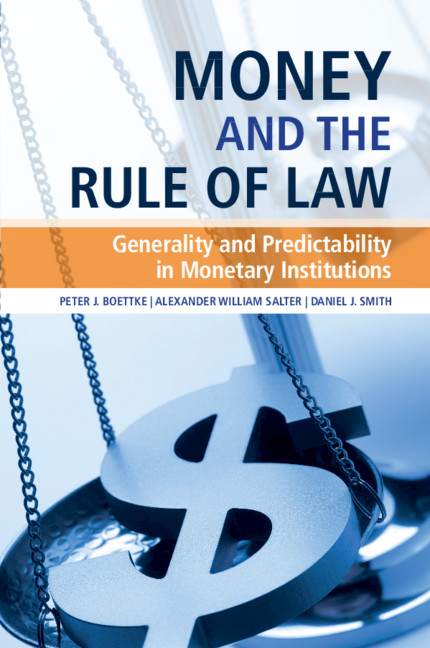“Money and the Rule of Law” by Peter J. Boettke, Alexander William Salter and Daniel J. Smith

Is the delegation of monetary policy to independent central banks that are granted constrained discretion a good or a bad thing? Most non-specialists have probably never pondered this question and many that have done so have probably concluded that it is a good thing. But is it? Peter Boettke, Alexander Salter and Daniel Smith think not and in Money and the Rule of Law they argue their case.
Parts of the book are difficult for a non-specialist to evaluate and some readers will find its US centricity unhelpful. The endless citations of previous works within the text rather than footnotes and the existence of a significant amount of repetition is also irritating. However, none of these failings should put off potential readers whether specialist or not and whether American or not. The book raises issues that deserve to be debated far more widely than they are.
The authors’ starting point comprises two points: first, that good money is essential for human flourishing and that, consequently “monetary institutions are not peripheral, but central, to human betterment” (page xi); secondly, that as Adam Smith long ago pointed out, governments have an unfortunate habit of spending in excess of revenue, accumulating these deficits into long-standing public debt and paying off the debt through the debasement of their currency. This tension creates a problem that needs to be addressed by all modern societies.
Sign up to receive blogs and book reviews via email.
To many, the solution lies in the existence of an independent central bank because it is seen as a way of transferring control over monetary policy into the hands of experts free from government interference. Furthermore, the conferring of discretion on these experts is considered necessary in view of the balance of policy considerations involved and in order to allow flexible responses designed to preserve macroeconomic stability, particularly in a crisis.
This solution superficially appears convincing but Boettke, Salter and Smith attack it head on. First, they challenge the notion that the US Fed has contributed to macroeconomic stability saying that “the Fed’s century-long experiment with discretionary central banking is at best inconclusive, and at worst a failure” (page 147). In particular, they argue that, far from discretion being essential in a crisis, it makes matters worse, asserting that the Fed contributed to the Great Depression of the 1930s and that its interventions may have made the recession resulting from the Global Financial Crisis worse than it would otherwise have been and, at the very least, have added to moral hazard in the financial sector. These claims may be surprising to some but they are by no means self-evidently wrong and, in relation to the Great Depression at least, the authors are able to point to the support of Ben Bernanke, the former Chair of the Fed, as well as Milton Friedman and others.
The failings of the Fed and other central banks might be accepted as unfortunate but inevitable stages in their learning process but Boettke, Salter and Smith suggest that the problem is far more fundamental than this would suggest. They point to the serious problems faced by central banks including technical problems (e.g. lack of clarity as to objectives), knowledge problems (uncertainty being, as Alan Greenspan put it, “not just a pervasive feature of the monetary policy landscape but the defining characteristic of that landscape”, page 23) and incentive problems (including the internal and external pressures brought to bear on central bankers, which the authors catalogue with some enthusiasm). They recognise that some of these problems are, at least in theory, soluble but they argue that “Knowledge problems render discretionary central banking not just difficult but impossible” (page 4). Discretionary central banking fails for exactly the same reason as other forms of central economic planning in that “monetary policymakers lack a feedback mechanism that generates the requisite knowledge to maintain, or even tend towards, monetary equilibrium” (page 37).
These are important points. It is odd that the West has largely rejected central economic planning on practical as well as philosophical grounds and yet appears to believe a planned monetary system is workable and it is even more odd that, despite evidence to the contrary, many continue to believe that it is possible for central banks to fine tune the system, turning the steering wheel to adjust to unexpected irregularities of the route, to use Friedman’s analogy. Consideration of the track record of central banks and appreciation of the problems that they face might thus of themselves be sufficient to cause us to doubt the merits of discretionary central banking.
That said, the failings and problems of central banks are not the primary reason why Boettke, Salter and Smith object to discretionary banking: their primary objection is that “discretion on the part of monetary policymakers is inconsistent with basic jurisprudential tenets of post-Enlightenment political thought” (page 13). In particular, it is “incompatible with the justificatory tenets of constitutional democracy” (page 15) and “fails to adhere to the rule of law in any meaningful sense” (page 146).
These claims may seem to be extreme but they deserve close attention. A proposal to transfer control over tax policy to an independent body of experts exercising “constrained discretion” based on vague and conflicting policy objectives would doubtless be greeted with incredulity. It would be regarded as incompatible with accepted principles of democratic control and the fundamental tenet of the rule of law that “questions of legal right and liability should ordinarily be resolved by application of the law and not the exercise of discretion” as well as the principle that “the law must be accessible and so far as possible intelligible, clear and predictable” (Bingham, The Rule of Law 2010). So why is the transfer of control over monetary policy viewed differently? It may be felt that control over monetary policy is very different from control over taxation, but is it? Monetary policy has a huge indirect impact upon property rights (e.g. it may result in an arbitrary redistribution of wealth and inflation results in a form of arbitrary taxation) and central banks now exercise discretionary power over the grant of liquidity that is opaque and unconstrained by anything other than very vague principles. Furthermore, the problem has become progressively more acute as central bankers (including even the European Central Bank) have interpreted their mandates widely and changed their views as to the way in which to balance various policy objectives and as they have engaged in increasingly novel activities (e.g. the Fed is now lending directly to US corporations which represents an extraordinary lurch away from free market principles).
So how should these concerns be addressed? Unfortunately, Boettke, Salter and Smith have no precise answer to this question. They argue that central banking should be rule-based rather than discretionary and, at one point, suggest that the answer may lie in the “Richmond Fed doctrine”, which “holds that the central bank should limit itself to the creation and supply of high-powered money to the market, even during financially turbulent times” (page 118). However, they clearly recognise that this could only ever be part of the solution and they describe the conflicting views of the three leading economists who have shared their concern about central banking (Hayek, Friedman and Buchanan) without clearly expressing their own views on the relevant issues. This is a significant failing but it is only fair to point out that the authors’ illustrious predecessors also struggled at this point and changed their views radically over the course of their careers. Perhaps the only viable and effective options (e.g. potentially, Hayek’s competing currencies or Friedman’s computer automated monetary policy) are so radical and so untried in a modern context that we all find them difficult to contemplate.
In any event, Money and the Rule of Law comprises a wake-up call: we need to ask ourselves whether we are sleep-walking into an economy governed by discretionary central planning that is both economically damaging and philosophically unacceptable. The book deserves to be widely read.
“Money and the Rule of Law: Generality and Predictability in Monetary Institutions” by Peter J. Boettke, Alexander William Salter and Daniel J. Smith was published in 2021 by Cambridge University Press (ISBN 978-1-108-79084-0). 184pp.
 Richard Godden is a Lawyer and has been a Partner with Linklaters for over 25 years during which time he has advised on a wide range of transactions and issues in various parts of the world.
Richard Godden is a Lawyer and has been a Partner with Linklaters for over 25 years during which time he has advised on a wide range of transactions and issues in various parts of the world.
Richard’s experience includes his time as Secretary at the UK Takeover Panel and a secondment to Linklaters’ Hong Kong office. He also served as Global Head of Client Sectors, responsible for Linklaters’ industry sector groups, and was a member of the Global Executive Committee.
